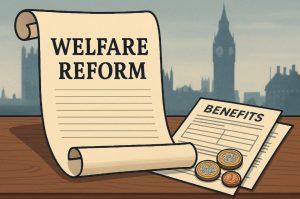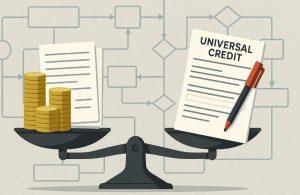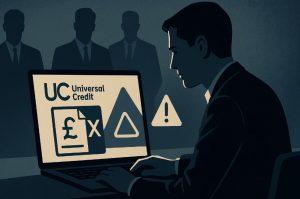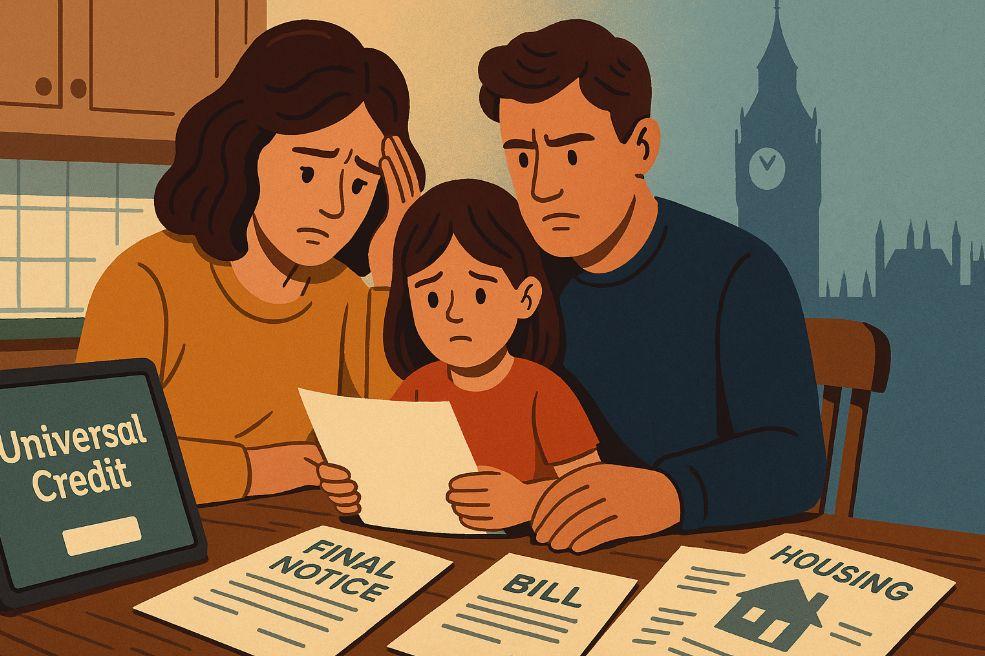In a time of evolving economic challenges and fiscal tightening, the UK government’s approach to welfare has undergone significant transformation. The 2025 Welfare Bill represents one of the most impactful policy shifts in recent years particularly for those relying on Universal Credit as a financial lifeline.
These legislative reforms are not just numbers in a budget they affect real people navigating rising living costs, housing instability, and employment pressures, especially in metropolitan areas like London. For many, understanding how this bill affects their entitlement isn’t optional it’s essential for survival.
This blog breaks down how the latest welfare reforms reshape Universal Credit eligibility, payments, and daily life. Whether you’re a working parent, single adult, or part of a low-income household, it’s crucial to know what’s changed and what you can do next.
What Is the Welfare Bill and Why Does It Matter?

The Welfare Bill refers to legislation introduced by the UK government that outlines major reforms to the country’s benefits and welfare system. Over the past decade, welfare bills have shaped how benefits are distributed, who is eligible, and how support is administered across the country.
The purpose of such bills is usually to reduce government expenditure, increase incentives for employment, and simplify a complex benefits system. However, the welfare bill has also stirred debates, particularly around its impact on low-income households relying on Universal Credit.
Since its rollout, Universal Credit has replaced six major legacy benefits, streamlining them into a single monthly payment. With welfare reforms continuing into 2025, many claimants in London and across the UK are concerned about how these policies influence their payments.
How Has the Welfare Bill Changed Universal Credit in 2025?
The 2025 changes to Universal Credit under the latest Welfare Bill have introduced several important adjustments. These reforms focus on tightening eligibility, changing how earnings affect payments, and modifying work-related requirements.
One of the key updates is the adjustment to the work allowance thresholds. Many claimants are now seeing reduced payments due to stricter income assessments. The taper rate remains at 55%, but the amount people can earn before deductions now depends on household circumstances more than ever.
Another significant change is the redefinition of the Minimum Income Floor (MIF) for self-employed individuals. Those with inconsistent earnings may find their benefits reduced even if they have legitimate fluctuations in income.
There is also an increased focus on “in-work conditionality,” requiring even working claimants to show they’re increasing their income or hours. This means more frequent check-ins with work coaches, especially in cities like London where part-time work is common.
Who Is Most Affected by the Recent Universal Credit Changes?
Certain groups are disproportionately affected by the Welfare Bill changes to Universal Credit. In particular:
Working-Age Families and Individuals
These reforms primarily target working-age claimants. With new work expectations and reduced allowances, single adults, especially those without children, may find their Universal Credit payments declining.
Low-Income Households in London
The cost of living in London is substantially higher than elsewhere in the UK. Even with higher Local Housing Allowance rates, the changes to Universal Credit do not adequately reflect these costs. Many Londoners face a shortfall between rent and housing support.
Single Parents and Disabled Claimants
Although some protections remain for vulnerable groups, the emphasis on work and reduced leniency in assessments makes it harder for disabled individuals and single parents to qualify for full benefits.
How Does the Welfare Bill Influence Eligibility and Payment Thresholds?

Eligibility for Universal Credit in 2025 is more stringent under the new Welfare Bill. The bill introduces a clearer distinction between full-time and part-time workers and how their earnings affect benefit entitlement.
Income Threshold Adjustments
The income levels at which benefits taper off have been revised. While the taper rate hasn’t changed, the allowance before it kicks in has, effectively reducing total monthly benefits for many.
Work Capability Assessments
Individuals previously considered unfit for work are now required to undergo reassessments. The new criteria are tighter, and appeals have become more difficult due to limited access to legal aid.
Sanctions and Conditionality
Claimants who fail to meet job search or work increase requirements risk being sanctioned. Sanctions under the Welfare Bill are more automatic and apply even to part-time workers.
What Role Does the DWP Play in Welfare Reform and Universal Credit Adjustments?
The Department for Work and Pensions (DWP) is the central government body managing welfare and Universal Credit. Under the Welfare Bill reforms, the DWP has expanded powers to enforce compliance and assess eligibility.
Administrative Reforms
There is now greater use of data matching between HMRC, DWP, and local councils to detect overpayments, fraud, or changes in circumstances.
Claimant Communication
The DWP has streamlined digital communication, encouraging online journaling and fewer in-person appointments. While efficient, this has made it harder for claimants without digital access to stay compliant.
How Do Housing and Child Benefits Interact with the Welfare Bill?
Housing Element Adjustments
The housing cost element in Universal Credit is impacted by the Local Housing Allowance (LHA) rates, which are capped. In many London boroughs, LHA does not cover average rental costs, leaving tenants with a gap to fill.
Child Elements Under Scrutiny
The two-child limit remains, and there is no additional Universal Credit payment for a third child unless exceptions apply. This policy has continued to attract criticism for pushing families into deeper poverty.
Can the Welfare Bill Reduce or Sanction Your Universal Credit Payments?

Yes, under the new legislation, Universal Credit can be reduced for several reasons:
Sanctions for Non-Compliance
If a claimant fails to attend job centre appointments, doesn’t apply for enough jobs, or refuses training, they may face a sanction. These sanctions can last from weeks to several months.
Deductions and Overpayments
The Welfare Bill has allowed faster recovery of overpayments. Even if an overpayment was due to administrative error, the DWP can reclaim the amount from future payments, often with limited appeal options.
How Are London Residents Particularly Affected by These Welfare Changes?
Housing Crisis and Rent Gaps
In London, the average rent significantly exceeds the housing element of Universal Credit. Claimants face increasing pressure to find affordable accommodation, which is increasingly scarce.
Council Tax Reductions and Local Support
Local councils offer Council Tax Support, but reductions vary. Some boroughs have cut back local assistance, exacerbating financial strain for Universal Credit claimants.
What Are the Wider Social and Economic Impacts of Welfare Reform?
The Welfare Bill’s changes to Universal Credit go beyond individual payments they affect broader social structures.
Poverty and Food Insecurity
Food bank usage has surged since the introduction of these reforms. Many claimants now rely on charities for essentials due to payment shortfalls.
Employment Pressure
While the intent is to push people into work, critics argue that many end up in insecure or underpaid jobs without real improvement in quality of life.
What Should You Do If Your Universal Credit Payments Are Affected?

Contact the Jobcentre or UC Helpline
If your payment has changed unexpectedly, contacting the DWP through your online journal or helpline should be the first step.
Seek Advice from Charities and Legal Services
Organisations such as Citizens Advice, Shelter, and Turn2Us offer support and can help you understand your rights or prepare an appeal.
Comparison of Universal Credit Payments Before and After Welfare Bill Reform (2024 vs 2025)
| Category | Universal Credit 2024 | Universal Credit 2025 | Key Change Description |
| Work Allowance (Single Parent) | £344/month | £292/month | Lowered threshold before tapering begins |
| Standard Allowance (Single, 25+) | £368.74/month | £360.00/month | Small reduction due to budget cuts |
| Housing Support (London, avg.) | £1,013/month | £970/month | LHA no longer tracking rising rents |
| Child Element (First Child) | £315/month | £315/month | No change |
| Third Child Support | Not Available | Not Available | Two-child limit remains |
| Minimum Income Floor (Self-employed) | Waived in some cases | Strict enforcement | Applies to more claimants regardless of income |
Conclusion
Understanding how the welfare bill affects Universal Credit is essential for managing personal finances, especially in high-cost areas like London. The recent 2025 reforms have tightened thresholds, increased conditions, and created new challenges for many households.
Staying informed through GOV.UK updates, consulting with advisors, and monitoring your Universal Credit journal can help you adapt to these changes. As policy continues to evolve, being proactive is the best defence against unexpected reductions or sanctions.
FAQs About Universal Credit Payments
How can I find out if my Universal Credit has been reduced?
You can check your online Universal Credit journal for any updates or notifications regarding reductions. It will detail the reason for any change.
What support is available for single parents affected by the welfare bill?
Single parents may access work coach support, childcare costs coverage (up to 85%), and local council support schemes. Charities can also offer legal and financial help.
Are these changes permanent or subject to review?
The Welfare Bill changes are reviewed periodically by Parliament. However, the 2025 updates are likely to remain in place until at least the next budget cycle.
How does the benefit cap apply in London?
The cap for couples or single parents in London is £1,835 per month. If total benefits exceed this amount, Universal Credit is reduced.
Is housing support still part of Universal Credit after the changes?
Yes, but the housing element remains tied to the LHA and hasn’t kept up with real rent prices, especially in high-cost cities like London.
What is the difference between sanctions and deductions in UC?
Sanctions are penalties for non-compliance with conditions, while deductions are repayments of debts or overpayments taken from your benefit.
Can charities or councils help with the Universal Credit impact?
Yes, organisations like Shelter, Trussell Trust, and local councils provide emergency grants, food, and financial counselling.









Leave feedback about this